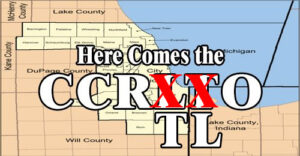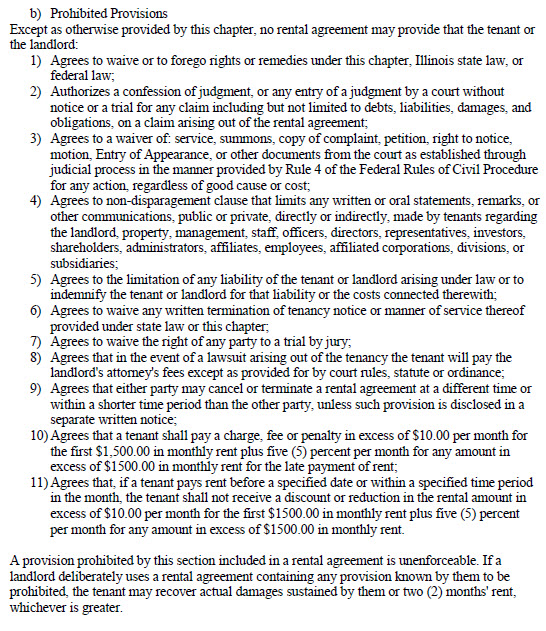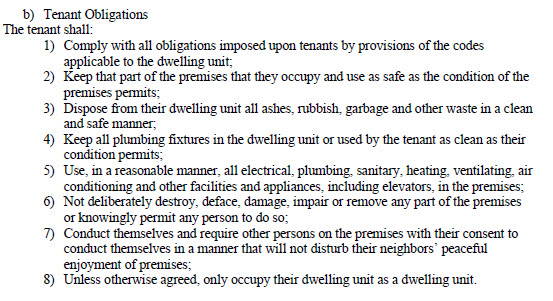 Landlord Call to Action
Landlord Call to Action
Suburban landlords have been sleeping for decades. And who can blame them? Suburban renting is nothing like the complex procedure of Chicago (and Evanston) renting. Sure, suburban housing providers have heard of the Chicago Residential Landlord and Tenant Ordinance (CRLTO) for years. Most don’t really know (or want to know) what’s in it. What they do know is that it doesn’t apply to them. Unless suburban landlords take a major stand, that’s all going to change soon with the newly proposed (and likely to be passed before the end of December, 2020) Cook County Residential Tenant and Landlord Ordinance (CCRTLO). And unless suburban (and Chicago) landlords get the word out on this, both city and suburban housing providers will suffer.
Why it Matters…
 Before we delve into some of the provisions of this newly proposed ordinance, let’s talk about municipal landlord tenant ordinances generally. One of the more arcane and maybe interesting legal concepts of a county-wide ordinance is that under Illinois law, “home rule” municipalities (like Chicago, Oak Park, and Evanston) will NOT be governed by the newly proposed CCRTLO. That might provide solace to Chicago landlords but it should not. This newly proposed ordinance is like a menagerie of tenant-favorable ideas that have been kicking around both the statehouse and the Chicago City Council for years. The new ordinance, in its original and now revised form contains some concepts that have been dancing around the CRLTO for years and it contains concepts that address what tenants’ advocates believe are shortcomings of the CRLTO. I think it is more correct to say that this is a “wish-list” of tenants’ rights. So why should a Chicago landlord worry? The trouble is that as soon as Cook County passes protections that are effectively greater than Chicago, can you envision any scenario where Chicago will not immediately propose and pass those protections as well? Chicago landlords can not ignore this issue.
Before we delve into some of the provisions of this newly proposed ordinance, let’s talk about municipal landlord tenant ordinances generally. One of the more arcane and maybe interesting legal concepts of a county-wide ordinance is that under Illinois law, “home rule” municipalities (like Chicago, Oak Park, and Evanston) will NOT be governed by the newly proposed CCRTLO. That might provide solace to Chicago landlords but it should not. This newly proposed ordinance is like a menagerie of tenant-favorable ideas that have been kicking around both the statehouse and the Chicago City Council for years. The new ordinance, in its original and now revised form contains some concepts that have been dancing around the CRLTO for years and it contains concepts that address what tenants’ advocates believe are shortcomings of the CRLTO. I think it is more correct to say that this is a “wish-list” of tenants’ rights. So why should a Chicago landlord worry? The trouble is that as soon as Cook County passes protections that are effectively greater than Chicago, can you envision any scenario where Chicago will not immediately propose and pass those protections as well? Chicago landlords can not ignore this issue.
The Proposed Ordinance
So what’s so bad? First, there’s a lot of regulation. Every lease governed by the CCRTLO will need to be in writing, regardless of the duration of the lease (See Sec 42-83). While I don’t think it is a good idea to have an oral lease, this ordinance will require that all leases are in writing. Once a landlord prepares a lease, the ordinance gives a laundry list of things that are prohibited from being included (See Sec 42-83(a)):
 Among the most important things to point out are that Cook County landlords will lose some of the rights that were an advantage to suburban landlords like the right to have a tenant waive the right to notice or the right to a jury trial. More importantly, like Chicago landlords, Cook County landlords will no longer be entitled to collect attorney’s fees. (The ordinance, like Chicago’s, says a landlord can collect attorneys fees when allowed by statute, ordinance, or court rules – those are very limited circumstances and do not apply to the vast majority of eviction situations).
Among the most important things to point out are that Cook County landlords will lose some of the rights that were an advantage to suburban landlords like the right to have a tenant waive the right to notice or the right to a jury trial. More importantly, like Chicago landlords, Cook County landlords will no longer be entitled to collect attorney’s fees. (The ordinance, like Chicago’s, says a landlord can collect attorneys fees when allowed by statute, ordinance, or court rules – those are very limited circumstances and do not apply to the vast majority of eviction situations).
Late fees will change. Suburban landlords will be limited to a $10 late fee per month for monthly rent up to $1500 and for rent over $1500, the late fee will be capped at $10 plus 5% of any amount over $1500. Chicago’s current formula is $10 for the first $500 of rent and 5% of any amount over that. Not that it matters as Chicago will surely adopt the same scheme once the CCRTLO becomes law, but currently, rent of $2000 per month would be limited to late fees of $35 in the suburbs while Chicago’s late fee would be $86.25.
Any landlord who attempts to enforce one of the prohibited provisions would be liable to a tenant for the greater of the tenant’s actual damages or two month’s rent.
The ordinance goes on to prohibit landlords from “imposing fees in excess of reasonable expense” and places limits on utility charges (See Sec 42-83(c)). Seems reasonable? Well, if the landlord violates this section, the tenant can sue for that same greater of actual damages or two month’s rent. What’s a “reasonable expense”? My guess is that lots of tenants will be willing to go to court to find out and the landlords will need to roll the dice on whether or not it is worth it to fight them to find out. There’s also a similar provision governing what kinds of rules and regulations attached to a lease are permissible (See Sec 42-85(a)(2)).
The law (See Sec 42-84(a)(1)) contains many of the CRLTO protections cribbed from Section 5-12-110 of the ordinance regarding the condition of the property, gives a 14 day right to cure defects or the lease is terminated, provides penalties and damages, including attorneys fees for landlords who fail to provide essential services (See Sec 42-84(a)(2)), and provides for a repair and deduct provision (See Sec 42-84(a)(4)). Like the CRLTO, there’s a penalty of “not more than 2 months rent or twice the tenant’s actual damages and reasonable attorney’s fees” if a landlord fails to provide possession at the beginning of a lease. (See Sec 42-84(a)(5)).
Here’s the part I really love. The tenant’s obligations (See Sec 42-84(b)), Just look at them:
 Here’s the section on penalties to the tenant for violating any of the above items:
Here’s the section on penalties to the tenant for violating any of the above items:
 Nothing is wrong with your computer. That’s the section on penalties. There are NO penalties akin to “two times the monthly rent or two times actual damages” for tenants who break a lease. There are no attorney’s fees. There’s NOTHING. No consequences. What does the tenant get for, say, deliberately destroying the premises? Well, the landlord has the right to serve a notice of termination, then wait out the time in the notice, file an eviction case in the Cook County Circuit Court, attempt to serve the tenant a summons, fight off challenges from tenants’ rights attorneys who will be drawn to the “easy money” of tenant defense work for minor technical violations, and then eventually get an order for possession that the Cook County Sheriff will execute after a long wait. As Yakov Smirnoff used to say – “What a Country!”
Nothing is wrong with your computer. That’s the section on penalties. There are NO penalties akin to “two times the monthly rent or two times actual damages” for tenants who break a lease. There are no attorney’s fees. There’s NOTHING. No consequences. What does the tenant get for, say, deliberately destroying the premises? Well, the landlord has the right to serve a notice of termination, then wait out the time in the notice, file an eviction case in the Cook County Circuit Court, attempt to serve the tenant a summons, fight off challenges from tenants’ rights attorneys who will be drawn to the “easy money” of tenant defense work for minor technical violations, and then eventually get an order for possession that the Cook County Sheriff will execute after a long wait. As Yakov Smirnoff used to say – “What a Country!”
UPDATE: Click here for what the Cook County board could do to make this ordinance more fair before the hearing to vote on this ordinance scheduled for December 15, 2020.
Access? Like Chicago, Cook County landlords will need to provide 48 hours access (Sec. 42-85) and landlord who violate the provision will be on the hook for an amount that is the greater of one month’s rent or twice the tenant’s actual damages plus attorney’s fees.
What else? Well, just like the sneaky bit slid in at the end of the recent changes to 5-12-130(j) in the mayor’s “Fair Notice” amendment to the CRLTO, tenants across Cook County will have a “one time right” to cure rent. If a landlord brings an eviction case for nonpayment of rent, the tenant will have an opportunity to make good on the rent at any time before the entry of an eviction order. If they do, the case will be thrown out of court. The law does say that the landlord will be reimbursed fees and costs for service of process “but not including attorney fees”. So landlords just have to eat those dollars. A tenant could actually just decide, merely out of vindictiveness, to withhold the monthly rent and run the landlord through the ringer in the courts, only to pay at the last moment while their landlord pays an attorney thousands of dollars to chase the tenant.
In addition, the Fair Notice rule in section in 5-12-130(j) that changed the landlord’s notice of intent not to renew from 30 days to 60 days for tenants who reside in a property between 6 months and 3 years and 120 days for tenants who have resided in a property for more than three years is being expanded to Cook County. Unfortunately, the CCRTLO makes landlord provide a 90 day notice of intent not to renew and if a landlord fails to provide that notice, the tenant may remain for another 120 days (See Sec 42-85(b)(4)). One of the concessions made in the fight over the Fair Notice rules in the City Council was that the notice period originally proposed at 90 days was reduced to 60 days. Cook County will try to undo that compromise.
And lease disclosures? We got ’em. Lots of ’em. No one can accuse Cook County of trying to save paper. Notice of code violations? Check. Bedbug notice? Check. Landlord obligation to pay for all pest control regardless of whether the tenant brought the bedbugs in or not. Check. Disclosure of name and address of landlord and registered agent for service of process? Check. Disclosure of Utility Costs? Check. Notice of pending foreclosure? Check. Penalties for violations? Yep. (See Sec 42-85(c)) Suburban leases will be at least as long as City of Chicago leases. Probably longer.
Security deposit rules are included too and these (See Sec 42-85(c)(7)) are, in many ways, more harsh than the CRLTO. There’s a limit on security deposits to one and one-half months’ rent. Worse, is that the Cook County law includes a prohibition on move in fees.
“A landlord may not avoid the coverage of this subsection by labeling the fee as something other than a security deposit, including “move-in” fee.
This totally ignores the time and effort landlords do and their right to be compensated for that time and effort, not to mention the desire to avoid the draconian security deposit rules. But wait, there’s more. Let’s say you want that maximum “one and one half month” security deposit. You’re going to be taking it on credit because you’ll be taking a depsit in installment payments:
A tenant shall pay the landlord, at the time the tenant moves into the premises or at any other time mutually agreed upon by the parties, the amount of the security required by the landlord. Any portion in excess of one month’s rent, at the election of the tenant, shall be paid either at the time the tenant pays the initial security deposit, or shall be paid in no more than six (6) equal installments no later than six (6) months after the effective date of the lease.
Are they kidding? Let’s work this out. If I rent a property to a tenant on July 1, 2021 for $1000 per month and I take a $1500 security deposit, I need to give the tenant the option to pay that $500 security deposit over 6 equal installments. If the tenant chooses the installment option, I have to take $83.33 in 6 installments. My read would be that for month 1 of the lease, I’d be looking for a check for $1083.33 for the security deposit and $1000 for the first month’s rent. I’d have to give the tenant a receipt for the $1083.33 and I’d have to put the deposit into the separate, segregated bank account. I could take a check for $2083.33 as long as I deposited the $1083.33 in the segregated account within 7 days under this provision:
Notwithstanding this section, a landlord may accept the payment of the first month’s rent and security deposit in one check or one electronic funds transfer and deposit the check or electronic funds transfer into one account if, within seven (7) business days of acceptance of the check or electronic funds transfer, the landlord transfers the amount of the security deposit into a separate account that complies with this section. (emphasis added)
However, that only applies to first month’s rent. In the second month, I would get a $1000 rent check and a separate check for $83.33 for the security deposit. I would then have to give the tenant another security deposit receipt and would have to deposit the $83.33 into the segregated account. I’d need to do all of that four more times in the next four months. The CCRTLO does not contain a provision requiring the payment of interest on a security deposit, however, the State of Illinois laws are still in place. So now, a landlord governed by the State statute will need to calculate interest on up to six different amounts to determine a security deposit interest payment. At a rate of .01%, that’s just a huge waste of time. Further, the fact that a landlord can only accept a check of mixed security deposit and interest shows the lack of thought and consideration that went into drafting this law. It seems no one thought these issues through very hard.
Do you still want to be a landlord? This thing reads like it was written by someone whose grandmother was stabbed by a landlord and they’re trying to get even.
There’s also a number of concepts that will be familiar to Chicago landlords like holding the deposit in a segregated interest bearing account, the totally ridiculous requirement (explain the consumer protection benefit of this one) of disclosing the name and address of the financial institution where the security deposit will be deposited on the written rental agreement (hint: there is no consumer protection benefit – this one is a “gotcha”). And then, much worse than the CRLTO, a Cook County landlord will have 21 days to return the deposit after the tenant vacates. How long after this passes will it take Chicago to change their time for security deposit return from 45 days to 21 days? Oh yeah, and landlords who violate: “If the landlord fails to comply with any provision of this section, the tenant shall be awarded damages in an amount equal to two times the security deposit and reasonable attorney fees.”
There’s a section on lockouts. There’s a requirement to attach an ordinance summary and a penalty along with the right to terminate if the landlord fails to do so (See Sec. 42-86). And one more fun change: the Cook County Commission on Human Rights will have the right to bring a civil action against landlords who “engage in a pattern of practice of violating the provisions of this chapter”. That’s awesome. Landlords will have one more arm of the government with unlimited resources to fight along with the army of tenants’ rights attorneys who regularly bring CRLTO cases.
Conclusions?
Will suburban Cook County landlords have any chance in this fight? Will Chicago landlords enjoy the new restrictions that will almost surely be coming their way? Look folks, this version of the law is dialed BACK about 50% from the law that was originally proposed. Do the Cook County Commissioners understand the chilling effect this will have on landlords? Do they understand at all the hard work that landlords do to provide proper housing to their tenants, all the while dealing in reams full of paper and disclosures? The level of regulation and the severity of the penalties are just plain disproportionate. At the same time, the eviction system is a joke and this law compounds it by failing to impose any reasonable penalties on tenants. This will raise rents and reduce property values. This is not fair. This is partisan. This is overbearing. This needs to be stopped. At a time when the government has foisted the cost of the Covid-19 pandemic on landlords in the public interest, this is how Cook County thanks them? Landlords, please stop this before it is too late.
What Can you Do?
Talk to your Cook County Commissioner. You can also find a link to the Action Center Illinois Realtors have set up to oppose the ordinance. Take the time to spread the word to your landlord and non-landlord friends. Get active. And, as always, join one of the many excellent property owners groups that are doing their best to educate the public and to advocate on behalf of housing providers.
